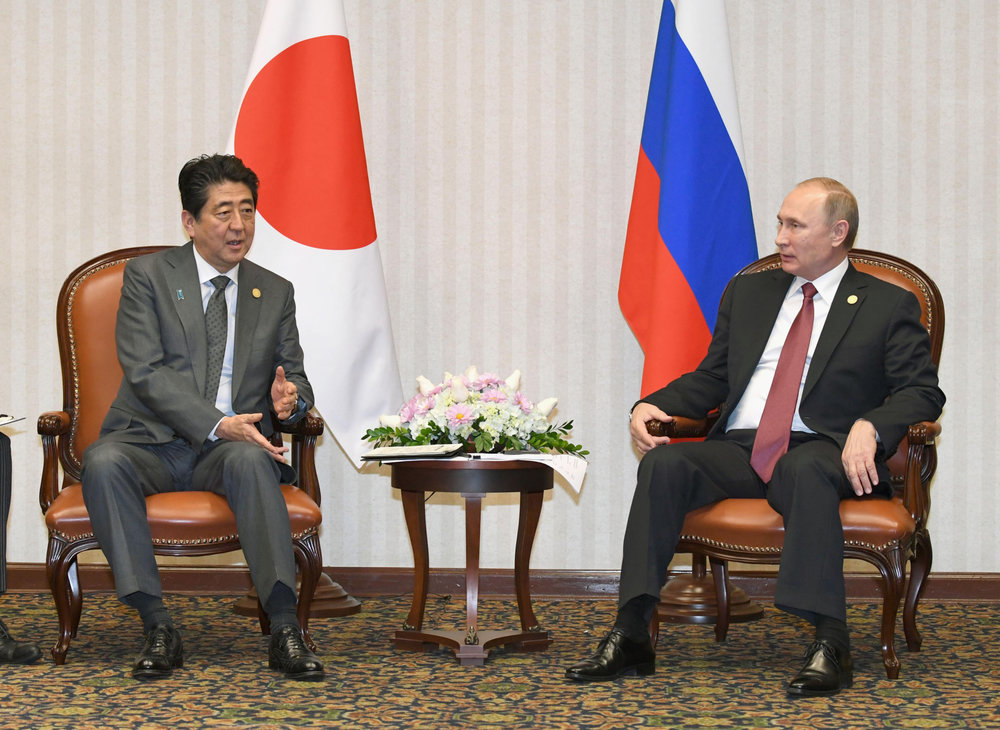Abe-Putin talks underline deep differences on territorial issue

A joint news conference in Tokyo by Prime Minister Shinzo Abe and Russian President Vladimir Putin on Dec. 16 threw a glaring spotlight on differences in priorities.
Abe focused on his goal to conclude a bilateral peace treaty based on an agreement to settle the sovereignty dispute over the Northern Territories, while Putin’s main interest was in Japan’s economic cooperation.
Sharp differences exist between the two leaders.
Facing the media after two days of meetings with Abe, Putin stressed the importance of the 1956 Japan-Soviet Union joint declaration in addressing the territorial issue. The document said the Soviet Union would hand over the Habomai islets and Shikotan island to Japan after the conclusion of a peace treaty, but did not make any direct reference to Kunashiri and Etorofu, the remaining two disputed islands off Hokkaido.
Putin also pointed to the possibility that Russia may retain its sovereignty over Habomai and Shikotan even if it agrees to return the islands to Japan.
Putin’s vision is a far cry from Japan’s position on the issue. Tokyo has maintained that a peace treaty formally ending World War II should be concluded after the issue of which country the four islands belong to is resolved.
Japan’s security treaty
Putin also referred to Japan’s security treaty with the United States, displaying his wariness about the possibility that U.S. military bases might be built on the islands after they are returned to Japan.
This argument is unacceptable for Japan.
Abe touted their agreement to start talks over joint economic activities on the Northern Territories as “an important first step toward the conclusion of a peace treaty.” But specifics of the activities have yet to be worked out.
This is an idea that was considered several times in the past. But it never materialized because Japan and Russia failed to agree on the question of which country should have jurisdiction.
This time, Russia has already made clear that joint economic activities would be subject to Russian laws, another sign that the two countries’ positions are at cross-purposes.
Referring to the absence of a peace treaty between Japan and Russia 71 years after the end of World War II, Abe said: “Our generation must put an end to this extraordinary situation.”
Despite his enthusiasm, however, the two days of talks underscored the grim reality that the outlook of bilateral negotiations remains unclear.
The Abe administration should not do anything that could raise excessive expectations of significant progress in the near future.
We understand Abe’s desire to resolve a legacy of the war that has been a festering sore between the two countries.
Efforts by the two leaders to build mutual trust are meaningful also from the viewpoint of contributing to regional stability.
But there is one thing Japan should not forget in its efforts. Tokyo should never compromise on universal principles, such as the rule of law.
Japan has joined Western countries in imposing economic sanctions against Russia in response to its annexation of Crimea in 2014.
But Tokyo agreed with Moscow on as many as 80 economic cooperation projects during the Abe-Putin meetings.
The deals may help build trust between the two countries but could undermine the unity among the Group of Seven major industrial nations in implementing sanctions against Russia. The Abe administration might appear to be hastily approaching Russia while putting the principle of the rule of law on the back burner.
With Donald Trump elected as next U.S. president, the international community is closely watching how U.S.-Russia relations and the situation in Syria may change.
While the territorial issue is important, the Japanese government should not act in haste in trying to resolve the dispute. It is vital to continue tenacious efforts, adhering to the basic principles of diplomacy.
(Source: asahi.com)
